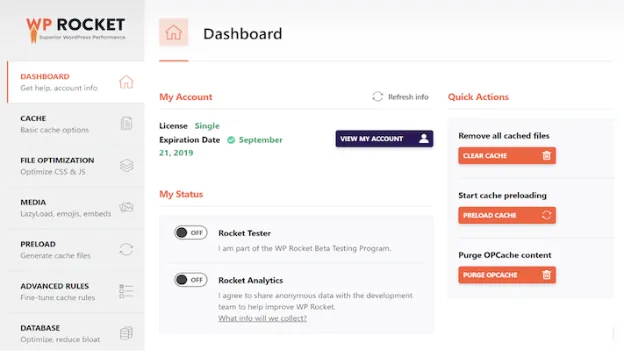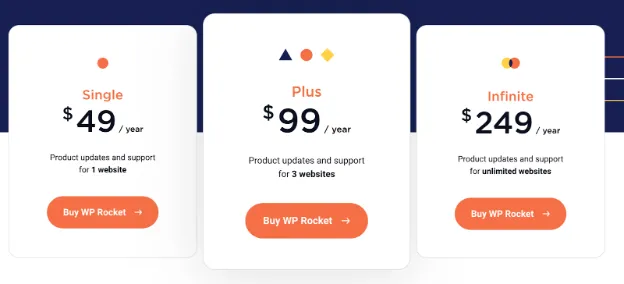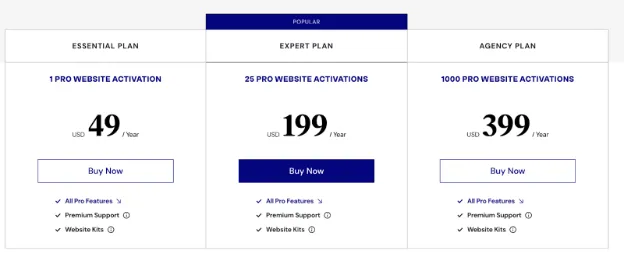How Much Does WordPress Actually Cost

How Much Does WordPress Actually Cost?
While WordPress is often advertised as a “free” option, there are a ton of hidden costs and headaches to consider when building a WordPress website. WordPress itself is just part of what you will need to have a successful site. In this article, we’ll dive into the actual costs of building a WordPress website and what to expect to pay in total.
According to one of the most trusted WordPress resources on the web, WPBeginner:
“Depending on your needs, your cost to start a WordPress website can range from $100 to $500 to $3000, to even as high as $30,000 or more.”
Let’s break down all the costs involved with starting a WordPress blog or website…
How much does WordPress.com cost?
For WordPress.com, there is a free option, but it’s almost impossible to monetize and is extremely limited. You would need to buy at least the $40 a month Business plan in order to be able to install plugins to get the functionality level that you would need.
WordPress.com is incredibly limited, and if you are looking for an all-in-one website builder you should look at website builders like JetPage or Wix.
How much Does WordPress.org cost?
WordPress.org is the popular open-source CMS and is free to download. Most people who use WordPress are using this option as opposed to WordPress.com. However, although the WordPress.org version is technically “free”, you will need to pay for web hosting, a domain, plugins, and themes to maximize the potential.
Along with the money you’ll need to spend just to get online, you will also need to invest quite a bit of time learning. WordPress is NOT beginner-friendly and will take a decent amount of web development and web design experience to use.
Not to mention the amount of time you’ll need to spend in the future on maintenance, updating your site, plugins, and themes to avoid getting hacked in the future.
So what will you have to pay to get a successful WordPress website up and running?
A breakdown of exactly how much WordPress will actually cost for a finished website
Web Hosting and Custom Domain
The first thing you’ll need to do is buy web hosting and a custom domain. This is what powers your website and allows it to be online through renting servers. The type of web hosting you’ll be deciding between includes: shared hosting, cloud hosting, or managed WordPress hosting.
Shared hosting is what you will see advertised a lot when people say “get a website for $3 per month”. The reason shared hosting is usually cheap is because you share server space and resources with other websites as tenants.
Going cheap by purchasing shared hosting will cost you performance versus the better options today. Because you are sharing server space with many other tenants, your website can be slowed down if other sites are taking up all the resources.
Shared hosting is also far slower than Cloud Hosting, leading to slower load times which will penalize your site’s rankings according to Google’s Page Experience Update.
Shared hosting is also not as scalable. If your site gets a huge surge in visitors, your website can go down if you don’t have the proper amount of bandwidth and server resources. This is not the case with Cloud Hosting, which can effortlessly scale to millions of visitors without a hitch.
You also don’t typically have the option to pay monthly, since shared hosting is usually paid annually or even for 2 or 3-year periods. Beware of the introductory promo offers for “$1.99/month” web hosting, since this usually only applies to 3-year plans upfront, and they raise the rate up to $8/month after that initial term ends.
Cloud Hosting is the premier type of web hosting widely used today. Because cloud hosting providers like Amazon Web Services (AWS) or Google Cloud Platform have huge data centers all over the world, they can easily scale resources to how many visitors you get.
They also can route traffic through whichever server or Content Delivery Network (CDN) is closest to your website visitors, significantly improving load times. This is why companies like Netflix, NASA, and Twitter all use cloud hosting (AWS).
While cloud hosting is slightly more expensive than shared hosting, around $29 per month, it’s an incredible value considering how powerful it is.
Best part of all, those performance gains from cloud hosting translate to improvements in Google rankings! According to a case study from Reboot online, simply switching from shared hosting to AWS cloud hosting resulted in higher Google Rankings.
One final option is to specifically pick Managed WordPress Hosting. This is hosting specifically designed for WordPress to make installation easier and performance more optimized.
Beware though, Managed WP Hosting can be either shared or cloud hosting, so make sure you inquire to see what they are really using “under the hood”.
Managed WordPress Hosting can come with some WordPress-specific benefits like better performance via caching and CDNs, better security, and more.
Here’s what one of the leading Managed WordPress hosting providers, WPEngine, charges:
As you get more visitors you will have to expand your plan, and you will need to pay for add-ons to monitor security. Once you factor in site monitoring and the extra layer of security, you’ll be paying $47 per month at minimum.
While you could save money on a cheap shared hosting plan that costs closer to $100/year, to actually get results and stand out from the competition, you’ll want to use cloud hosting or Managed WP Hosting in this day and age.
Total Web Hosting Cost Estimate: $47 per month or $564 per year for Managed WP Hosting with security and maintenance add-ons.
WordPress Setup and Web Design
While you might think web design is as easy as picking a theme and plugging your information in, with WordPress there’s a lot more to do to get it looking right. In order for your site to look modern and professional, you’ll either need to learn a bit of web design, or hire a professional freelancer/contractor.
Professional design services can charge thousands to design a website. You’ll see videos everywhere telling web designers to charge more than $3,000 per site.
While you can find people who might set up a website for you on the cheap, you will get what you pay for and will end up spending more time fixing all the mistakes or shortcuts they’ve made.
If you do it yourself, you will need to make sure you understand how to design a “responsive site” which means that it will look good no matter whether it’s viewed on desktop, phone, or tablet.
Unless you have experience, you can expect to spend weeks trying to tweak your website to make it look nice and fix formatting issues.
Total Cost of a Professional Web Designer: Up to $3,000 per site.
If you don’t want to pay a premium for professional web design, you will need to instead purchase a theme and do it yourself.
WordPress Themes
If you want to start designing and creating your custom site, you’ll typically need to purchase a premium theme so you can have some type of template to start from.
There are some “free” themes, but beware these are typically “freemium”, which means they will be very limited unless you buy the Premium version. Using the free version may mean you won’t be able to change certain colors or fonts.
You can either download one of the “free” themes, or pay for nicer premium ones. Every element you add to your WordPress site will need to be maintained whether it’s a theme or a plugin.
There are millions of themes to choose from, and you have to make sure to find ones that are lightweight, mobile-friendly, and won’t slow down your website.
Paid themes typically range from $29 to $79 on average, but some can cost hundreds. The best themes will add the ability to do “drag-and-drop” like Elementor. Most of the ordinary themes don’t have drag-and-drop editing, which is a huge drawback.
Themes also are often bulky and take up a lot of size and bloated Javascript on your website, which slows down your loading times and often leads to failing Google’s Core Web Vitals (CWV).
Once you have your theme, you’ll need to start getting plug-ins to add functionality and secure your site.
Total Theme Cost: $29 to $79 per theme.
The Best WordPress Plugins
Plugins give the ability to do drag-and-drop, secure your website, optimize performance, and more. There are free ones available, but many of the ones you will need will cost money.
It’s a common misconception that WordPress is drag-and-drop out of the box, which is not true. You will need a premium drag-and-drop theme like Elementor.
Plugins work similarly to apps on any app store. There are thousands to choose from, which means endless options for customization, but also endless confusion. You’ll need to know what type of functionality you’ll need.
Beware that the more plugins you install, the slower your website will be, along with adding additional security risk. The reason is that each plugin is made by independent developers, and there is no way to verify whether they are maintaining the plugin to the highest security standards.
WordPress without plugins is really not that useful of a platform, and the main reason why the majority of users like the WordPress.org version over the WordPress.com version.
You will also be responsible for keeping WordPress core, your theme, plugins, and server’s PHP version up to date. Sometimes plugins will stop being compatible with the current version of WordPress core, your web hosting’s PHP version, or create formatting issues by not integrating well with your chosen theme.
What WordPress Plugins do you need?
WP Forms
WP Forms allows you to set up contact forms, and integrate your email marketing service so you can create nice opt-in templates.
While it starts at $49.50 a year, in order to integrate email marketing you will need to upgrade to the $99 a year option, and to accept any payments you will need to pay $199 a year.
Monster Insights
Monster Insights allows you to connect Google Analytics to your WordPress site, and set up conversion tracking. While it starts at $99 per year, if you want to set up Advanced Conversion Tracking you’ll need to pay $199 per year.
SEO Plugins: Yoast or AIOSEO
These allow you to set up basic SEO features like meta title and descriptions, and will analyze your on-page SEO with a checklist. While they all have a free version, in order to get all the SEO features and data, you will need to pay around $99 per year.
While they provide basic on-page SEO help, they do not help you with keyword research and are not updated to check how your content does in relation to the latest updates like the Google Product Review Update.
WP Rocket
WP Rocket is a caching plugin. This will help you speed up site performance, though often this alone is not enough to get your site passing Core Web Vitals.
WP Rocket starts at $49 per year, and the price goes up depending on how many sites you have.
Backup Plugin: JetPack
With all the WordPress hacks, this will make sure your site is backed up and provide spam protection and some malware detection. It costs around $39.95/month or $479.40/year.
Without premium plugins like JetPack you are at extreme risk for spam, malware and having your site completely deleted if something goes wrong.
Security Plugin: Sucuri
While JetPack provides security against malware and spam, you will need a plugin like Sucuri for total protection from the numerous hacks that occur on WordPress. In fact, according to an examination of over 11,000 hacked sites, 78% of observed hacks occurred on WordPress and 56% of those are a result of vulnerabilities in outdated WordPress plugins, themes, and/or core.
Succuri starts at $200 a year but can go up to $500 a year if you want faster removal of malware. Having to wait over 30 hours for Malware removal puts your site at a huge risk.
Drag-and-drop plugin/theme: Elementor
Elementor will allow you to add drag and drop editing functionality to your website. Without a drag and drop editor, WordPress is almost impossible to customize easily for non-coders.
It starts at $49 per year, but if you have more than one site you will need to pay $200 per year.
These are just some basic plugins to get started, and you may need to add additional plugins to really finish the type of website you need.
Total Initial Cost of Plug Ins: $1,027 to $1,577 per year for one site.
WordPress Maintenance Costs
Because every single part of WordPress requires maintenance and updating, many people opt to pay for an agency to maintain their site. Sometimes the same one that they pay to build their site.
According to WebFX, maintenance can run you up to $449 per month!
This is something you could do yourself if you the time and a bit of web development knowledge, and doing it poorly could result in serious security issues.
Total Maintenance Cost: $119 - $449 per month. If you choose to do it yourself, expect to spend at least a few hours per month on this.
Total Cost of WordPress for one year
After factoring in all these costs, you can see that WordPress is far from “free”. Especially if you want a fast, secure site that will actually get results. Not to mention the amount of time and knowledge you will need to spend on building and maintaining your site.
Total Estimated Cost: $1,739 - $5,669
Keep in mind this is even if you are just looking to make a simple blog or affiliate website. If you want to sell digital products like online courses, e-commerce, or paid newsletters, then your costs and time investment will be significantly more.
Cheaper and Easier WordPress Alternatives
The good news is you don’t need to pay this much since there are many superior alternatives in 2022! If you’re looking to get an amazing affiliate website or a blog, you can use JetPage instead.
You don’t need any web design or web development experience. And you can have an amazing modern site up and running in minutes! Plus it’s already optimized for technical SEO and you won’t need any expensive plugins or hosting!
Unlike WordPress where fewer then 25% of websites pass Core Web Vitals, 100% of JetPage sites pass Core Web Vitals on Desktop and Mobile out of the box!
For only $29/month (or $290 per year with annual discount) you can have an amazing site and save thousands of dollars and months of your time so you can focus on what really matters: creating really good content frequently.
You can see some of the amazing results customers are getting here, or try JetPage for yourself, free with no credit card required by clicking HERE.
Related Posts
JetPage vs Webflow: What's the best website builder for you?
JetPage vs WordPress: Best Website Builder for SEO, blogging, and affiliate marketing?
JetPage vs Wix: Which website builder should you choose?
Jetpage vs Squarespace: What's the best website builder for SEO?
JetPage vs Ghost: What's the best blogging platform?
JetPage vs Medium: What's the best for blogging?












